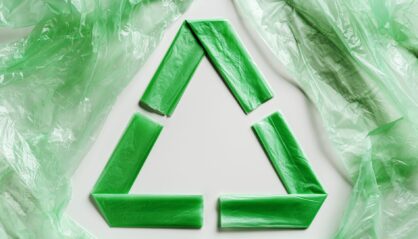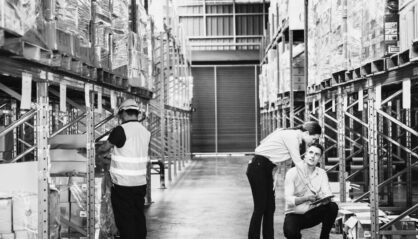Eco Friendly Choices When Designing Sustainable Workwear

Is your company’s workwear as eco-friendly as your customers?
Making eco-conscious choices about the businesses they engage with is becoming more commonplace for consumers across the globe.
In an attempt to decrease their environmental impact and become relevant with today’s environmentally aware consumers, businesses across all industries are looking to implement more sustainable and eco-friendly operational processes.
When looking at ways to reduce their carbon footprint and environmental impact, businesses need to look at three different ‘scopes’ of emissions:
- Scope 1: the direct use of fuel
- Scope 2: purchased energy, such as electricity and gas
- Scope 3: all other business activities
One of the activities that sits within Scope 3 is the design and manufacture of work uniforms.
Not only is a sustainable and eco-friendly approach to uniform design helpful in achieving your business sustainability goals, it can also serve as a visual representation of the sustainable practices of your company.
In this article, we’re going to look at some of the key considerations to take into account when approaching sustainable workwear design, including the use of organic and recycled materials and embracing an ethical approach to your supply chain.
Incorporating organic fabrics
The ‘fast fashion’ approach to clothing and textiles is a major contributor to global emissions, with the Soil Association suggesting “as the world’s second most polluting industry, textiles urgently needs to pull its socks up”
And they are right.
At JSD, we’ve been at the forefront of sustainable workwear design since we launched in the 1990s. One of the ways we help ensure that work uniforms are kind to the environment is to encourage the use of organic fabrics, where appropriate.
For example, organic cotton is grown without the use of pesticides and fertilisers that can pollute water supplies and damage soil health. It also uses 91% less water than traditional cotton production. Choosing certified organic cotton ensures strict standards have been met throughout the entire production process.
There’s also an increasing demand for the use of bamboo in eco-friendly uniforms. Bamboo is incredibly fast-growing and is able to grow without the need for any chemicals, making it a naturally sustainable and eco-friendly fibre. Bamboo fabric is also incredibly soft, breathable and has moisture-wicking properties – making it perfect for comfortable workwear that keeps your employees cool and dry, even on hot days.
The use of organic fabrics not only reduces the environmental impact of your uniforms, but also sends a clear message to both employees and customers that your brand is committed to environmentally responsible choices.
Using recycled materials
An increasing number of companies are also opting to use recycled materials for their sustainable uniforms, with a great example of this approach in action being Hesburger.
All the t-shirts and jackets worn by Hesberger staff are made from textile waste, which is saved from landfill, re-fabricated and used to make the chain’s retail uniforms.
This innovative approach uses 99% less water and reduces carbon emissions by 50%, compared to sourcing new materials for their uniform.
But sustainability isn’t just about the materials used in production, it’s about the entire lifecycle of your staff workwear.
At JSD, we pride ourselves in offering our clients a wide range of options when it comes to bespoke uniform disposal practices, making it easy to recycle or upcycle your staff uniforms.
Durability & longevity
Another key consideration in making eco-friendly choices in the design of your workwear is to make sure your uniforms are built to last.
The more durable your uniforms are, the less frequently they need to be replaced – which can reduce both your business costs and your environmental impact.
As part of our design process at JSD, our team is committed to understanding the day to day responsibilities and challenges of each of your employees, so we can create uniforms specifically built to withstand the daily wear and tear.
The importance of ethical manufacturing
We’ve talked a lot about how your choice of materials can improve the sustainability of your work uniforms, but we also need to consider how your uniforms are made.
The rise of fast fashion has highlighted the human cost of cheap clothing, and responsible businesses are demanding change.
Ethical manufacturing prioritises safe working conditions, fair wages, and respect for every individual involved in producing your workwear.
Businesses dedicated to sustainability have a duty to consider whether the people manufacturing their uniform are guaranteed a living wage, a safe working environment, and are free from exploitation. They also need to consider whether the supply chain for their retail uniforms empowers local farmers and contributes to stronger communities.
A key part of ensuring the ethical manufacturing of your work uniforms is transparency, and being able to trace the journey of your uniform production – ensuring standards are upheld at every step.
This is an area that JSD excels in, highlighted in our article on supply chain transparency being the future of sustainable fashion.
Sustainable workwear designed around your needs
The shift toward sustainable business practices is no longer a choice, but a necessity for organisations that want to remain relevant in the modern world.
Your retail uniforms and staff workwear can be a powerful statement of your commitment to environmental responsibility.
JSD are pioneers in sustainable uniform design. From research and design to development, manufacture, and distribution, we ensure that every aspect of your staff uniforms are sustainable and ethical. Find out more about our team HERE.
By working together, we can create high-quality, eco-friendly uniforms that not only make your employees look great but also reflect your company’s vision for a better future.
Contact us today to find out more.





